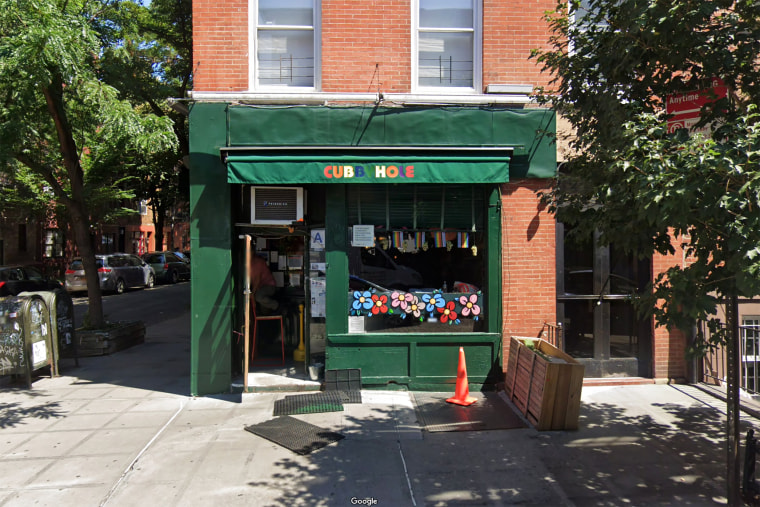Author and journalist June Thomas hadn’t been to a softball game until 2022, when she was researching her new book, “A Place of Our Own: Six Spaces That Shaped Queer Women’s Culture.” She admits this is strange for a queer woman, especially one who considers herself an expert on the spaces her community occupies.
“I’m a person who likes to stay indoors,” Thomas joked about her absence on the field.
The softball diamond is one of six essential spaces for queer women that Thomas writes about in “A Place of Our Own,” her new cultural history due out Tuesday. She also explores lesbian bars, feminist bookstores, rural lesbian separatist communities, feminist sex toy stores, and LGBTQ vacation destinations like Cherry Grove and Provincetown. It’s a list, Thomas told NBC News, that she curated with a desire to document spaces that queer women could “shape and change.”
“They all shaped what we now think of as lesbian culture, and they all have lessons to teach readers—both gay and straight—about the history of the late 20th and early 21st centuries,” Thomas writes in the book’s introduction. She adds that bisexual, transgender, and other queer women have also played central roles in these spaces.
Another priority for Thomas was describing the personal risk that generations of queer people have taken to participate in these physical venues. During the Lavender Scare, a period from the late 1940s through the 1960s in which thousands of gay men and women in the federal government lost their jobs for fear of communist ties, many women chose to go to private parties rather than lesbian bars because fear that they would be caught in a police raid. Other women were careful to travel to neighborhoods far from their own so as not to be seen by friends or family, Thomas writes.
“I wanted to at least try to help people get a sense of how challenging it was, how much justifiable fear and danger there was in going into these spaces,” she said.
Although lesbian bars are arguably the best-known queer women’s spaces that Thomas writes about, their numbers have declined at a particularly sharp rate in recent decades. Despite experiencing a renaissance in recent years, the number of lesbian bars in the U.S. has declined from about 200 in the 1980s to about 35 in 2023, according to an NBC News count. Thomas considers this decline a “banana” and celebrates the needs these companies have served for generations of queer women, including herself.
Half a century ago, “the only place you could have any hope of expressing your feelings of being open, of just not having to hide and lie,” she said, “was in a lesbian bar.”
Now, she’s grateful that many lesbian bars have evolved to include a broader clientele. The Cubbyhole in New York City (made famous when Madonna waved at the bar during a 1988 interview on “Late Night With David Letterman,” according to the book) now says on its website that it is “a safe space for all”. while her neighbor Henrietta Hudson claims it is “a queer human space built by lesbians.”

“It’s hard enough to get into a space to meet people. That’s enough stress,” Thomas said. “Being able to let your guard down, that’s still important. But I think there are more places where this is possible now than ever before.”
The evolution of spaces for queer women has often been led by women of color, who for decades have not been as welcome in many of the most popular lesbian bars. Thomas writes about the Shescape 7, a group of black and Latina women, including award-winning writer Jacqueline Woodson, who in 1986 filed a complaint with the New York City Commission on Human Rights alleging discrimination by the organizers of a grassroots political party. women in the city.
“Anyone who entered a lesbian club during this period could see who was allowed in and who was excluded,” Thomas writes.
Beyond the drink
Thomas emphasizes that many women were “very specifically trying to have a place that was quieter, a place where there was no drinking.” Feminist bookstores, which she describes as “lesbian enlightenment spaces” that hosted everything from author readings to 12-step programs, were one such space.
These bookstores were particularly important to Thomas, who said “you go to a bookstore to find out who you are.” In her book, she tells how she worked at the feminist bookstore Lammas in Washington, D.C., in the 1980s, and how she found an apartment when she moved to Madrid, thanks to a Librería Mujeres bulletin board.
But the rise of online shopping and big box stores in the 1990s made surviving as an independent bookstore especially difficult, Thomas writes. She goes on to detail the plight of the Amazon Bookstore Cooperative, a Minneapolis feminist literature destination founded in the 1970s that closed after a years-long legal fight with Amazon.com over its competing names.
“It’s all too easy to see the mass closure of feminist bookstores as a failure,” Thomas writes. “But the women who created and worked in these stores were not motivated by thoughts of longevity. Their goal was to establish places that would transform the lives of the women who walked through their doors. By that measure, they were extremely successful.”
For more from NBC Out, sign up for our weekly newsletter.
This story originally appeared on NBCNews.com read the full story






































